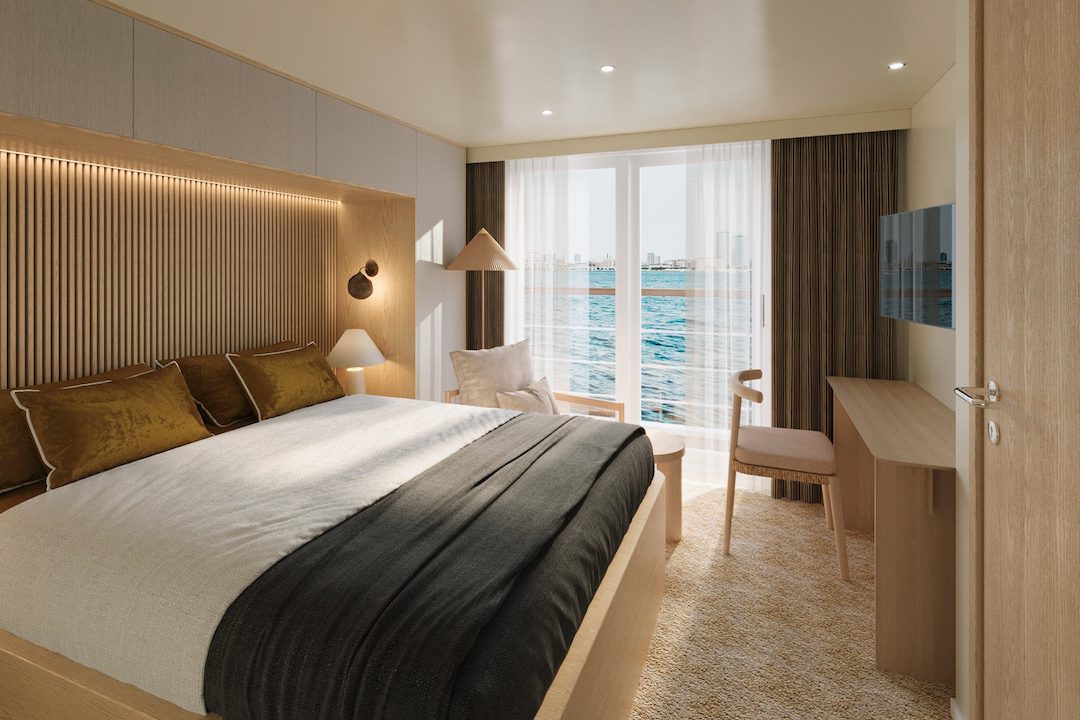– THE FINE PRINT –
Terms & Conditions
PASSAGE TERMS AND CONDITIONS
Upon signing the booking and these Passage Terms and Conditions and paying the deposit applicable for all passengers named in the booking (each a “Passenger”), each Passenger enters into a contract on these Passage Terms and Conditions (the “Passage Contract”) with Compagnie du Ponant Pty Ltd ABN 35 166 676 517 (the “Company”). The person signing the booking warrants that they are over 18 years old, have the authority to bind each Passenger to the Passage Contract and indemnifies the Company, against any loss or damage arising from a breach of that warranty. The Passage Contract constitutes the entire agreement between the parties and supersedes all and any prior agreement, arrangement, representation or understanding in respect of the Transportation or any other matter.
The Passenger agrees that all rights, exemptions from and limitations of liability, defences and immunities referred to in this Passage Contract which may be invoked by the Company automatically inure for the benefit of the Company’s related bodies corporate and all their servants and agents, the Vessel and its registered owner and any charterer and operator and all their servants and agents. The Passenger undertakes not to sue or bring or permit to be brought proceedings against such third parties including the Vessel, and will indemnify the Company in respect of all loss and damage arising from any such action being taken against them by any person in connection with the Transportation. For the purposes only of the undertaking given by the Passenger in this clause the Company contracts as the agent and trustee of those parties intended to benefit from the undertaking.
1. Introduction
The Company agrees to provide the transportation specified in the booking (the “Transportation”) on the nominated vessel or any substitute vessel (the “Vessel”) to the Passenger on the terms of this Passage Contract. The Passage Contract is personal to the Passenger, and neither the Passage Contract nor the Transportation may be assigned or transferred to another person. The Passage Contract cannot be varied or amended except by writing signed by a duly authorised representative of the Company. The terms of this Passage Contract are separable and the invalidity of any provision does not impair the validity of any other provision.
2. The Transportation
The Company offers expedition and adventure styles of cruising to locations where conditions can be unpredictable and demand a degree of flexibility in planning and operational responses. It may be necessary to make changes to the planned voyage route at short notice for safety or operational reasons. While the Company will use reasonable endeavours to adhere to the published itinerary for the Transportation, the Company cannot guarantee that the voyage will be exactly as planned and the published itinerary does not form part of this Passage Contract.
Further the Company reserves to itself and the Master the absolute right for any reason to substitute any other vessel for the nominated Vessel, change, add or omit the scheduled ports of embarcation, disembarkation and call, vary the route, delay to terminate the Transportation, and to transfer the Passenger and the Passenger’s baggage to any other vessel or to any other means of transportation, even though resulting in delay, and the Passenger has no right to refund and the Company has no obligation or liability to the Passenger in respect the change except as provided in this clause 2. Subject to the exceptions in clause 2 above:
If the scheduled date or hour of sailing is delayed and accommodations are not available aboard the Vessel, the Company may arrange, at no additional expense to the Passenger, hotel accommodation for the Passenger for the duration of the delay.
(a) If the scheduled port of embarkation is changed, the Company will arrange, at no additional expense to the Passenger, substitute means of transportation (by sea, air or land to be determined by the Company) from the original port of embarkation to the rescheduled port of embarkation.
(b) If the scheduled port of disembarkation is changed the Company will arrange, at no additional expense to the Passenger, substitute means of transportation (by sea, air or land to be determined by the Company) to the point of disembarkation from the nearest port at which the Vessel calls, without right to any refund and without further liability of the Company from the time the Passenger leaves the Vessel.
(c) If for any reason the scheduled duration of the Transportation is shortened, the Company’s sole liability is to refund to the Passenger, on a pro rata time basis, the amount of the passage fare not used.
(d) If for any reason the scheduled duration of the Transportation is lengthened, the Company will have no liability to the Passenger for the extended period and the Passenger will not be entitled to any payment or compensation.
(e) At any time before the Vessel’s departure the Company may cancel the Transportation or terminate the Passage Contract whenever it reasonably considers this is justified on operational, commercial or other grounds, in which case, the Company’s only liability will be to refund to the Passenger the passage fare net of any unrecoverable payments or commissions already made by the Company to third parties in respect of the Passage Contract or the Transportation.
3. Liability
This Passage Contract constitutes the entire agreement between the parties (other than the Company’s on-board rules and procedures) and the Company excludes any and all representations and warranties that may have been made prior to or subsequently to the formation of the Passage Contract. This exclusion does not apply to any warranties or statutory guarantees which cannot by law be excluded, limited or varied. In case the Company breaches such a non-excludable statutory warranty or guarantee the Company’s liability is limited to providing the Transportation again, or paying to the Passenger the price of the Transportation.
Except as otherwise expressly provided for in this Passage Contract, and except to the extent the Company, its employees and agents, related bodies corporate or others for whose actions the Company is responsible (together in this clause the “Releasees“) have acted unlawfully, fraudulently, in breach of this Passage Contract or the rights of others, negligently or wilfully the Passenger releases the Releasees from all claims, causes of action and actions that the Passenger now has or may in future have in respect of death, personal injury, property damage, economic or financial loss or any other loss or damage of any nature suffered or incurred in connection with this Passage Contract or the Transportation.
4. Acknowledgement of risk
The Transportation may include the opportunity for the Passenger to participate in various sports and recreational activities. These activities include but are not limited to zodiac transfers, fishing, kayaking, snorkelling and swimming either on board or off the Vessel (“Recreational Activities“) and may involve the use of equipment. The Transportation itself and the Recreational Activities may present certain dangers and risks including exposure to illness and disease of other passengers, the effects of exertion to which you are not accustomed, injury or death by interaction with flora and fauna, the effects of weather, remoteness and lack of access to medical facilities and the need for or unavailability of evacuation or rescue services.
The Passenger acknowledges that:
(a) there are risks and dangers involved with their participation in the Transportation and Recreational Activities, and that these are potentially hazardous or dangerous activities that can result in serious injury or death;
(b) the Company cannot guarantee the safety or welfare of the Passenger in any Recreational Activities and provides equipment and instruction solely to enhance the Passenger’s enjoyment;
(c) the Passenger knowingly and voluntarily assumes the risk of using the Company’s equipment and participating in Recreational Activities;
(d) the Passenger must participate in any training necessary to participate in Recreational Activities and must follow the rules and procedures maintained by the Company;
(e) the Master has sole discretion in deciding whether the Passenger may participate in Recreational Activities depending on the Master’s and the ship doctor’s assessment of the Passenger’s physical ability, in relation to the weather, tides and other safety considerations at the time; and
(f) the Passenger may be required to sign an Indemnity and Release before being allowed to participate in any Recreational Activity.
The Passenger releases the Company from and waives all rights of action in relation to any death, physical or mental injury (including aggravation of an existing physical or mental injury), disease or aggravation of an existing condition arising from or to the extent attributable to the Passenger’s participation in Recreational Activities. This release and waiver does not apply to the extent the Passenger’s loss or damage is caused or contributed to by the Company’s recklessness or deliberate conduct.
5. Documents, health, disabled people and people with reduced mobility, minors, conduct and search
Documents
(a) The Passenger is responsible at their own cost for obtaining and complying with any Government travel requirements, must possess and must present exit, entry and other necessary visas, vaccination certificates and other required documents, and must arrive aboard the Vessel by the time fixed by the Company or, if no time is fixed, early enough to complete departure procedures.
(b) The Company may under no circumstances be held liable for the consequences of the Passenger’s failure to comply with police, customs or medical formalities before or during the cruise. A Passenger who is unable to board a flight or the Vessel, due to failure to present the required documents, may not claim any refund or compensation from the Company.
(c) Passengers’ passports will be checked against national and international criminal databases, in particular Interpol databases.
Health
(d) The Passenger represents and warrants on their own behalf, and on behalf of any minor Passenger traveling with the Passenger that they are physically and mentally fit to travel, to disembark/embark at ports of call or to go on boat excursions, to respect the Master’s and the crew’s orders at all time and that their health will not impair the safety of the Vessel or inconvenience the other passengers or crew.
(e) At the time of booking the Passenger must inform the Company in writing of any physical or mental illness, disability or pregnancy which may affect the Passenger’s fitness for travel, including details of medications which may impact on their ability to travel safely. The Passenger undertakes to inform the Company of any change in their medical condition that may have an impact on their care on board. To the extent permitted by law, the Company may refuse to embark the Passenger at any port or place if in the opinion of the Company, the Passenger is physically or mentally unfit to undertake or continue the Transportation, the medications prescribed to a Passenger are not legal medications in any jurisdiction, or if the Passenger will enter the end of the 24th week of pregnancy by the completion of the Transportation. The reason for these restrictions is to ensure the safety of Passengers as far as reasonably practicable.
(f) To the extent that a failure to report any such condition affects the Company’s ability to provide the Transportation to the Passenger safely and effectively, or compromises the Company’s ability to care for, assist or respond to illness or impairment of the Passenger, or has the effect of delaying or changing the route or itinerary, the Company will not be liable for any loss or damage suffered by the Passenger. In addition to any other exclusion, limitation or release contained in the Passage Contract, the Passenger releases the Company from any and all liability for any injury or damage connected with the Transportation which is related to a pre-existing illness or disability. The Passenger acknowledges and agrees that the Company has no responsibility or obligation to provide any special services or medical equipment to the Passenger, other than as required by law.
(g) It is the Passenger’s responsibility to bring on board sufficient supplies of any prescribed or other required medication for the duration of the cruise, and to ensure that possession of such medications will not infringe the laws of any country on the itinerary. Passengers undertake to secure those medications and to take medication in accordance with medical direction and not to share medications with others.
(h) Any charges incurred by the Passenger for medical reasons, including, but not limited to physicians, surgeons, hospitals, medications, diagnostic facilities, air ambulance evacuation or ground ambulance, must be the sole responsibility of the Passenger. The Passenger must indemnify the Company for any funds advanced on account of any such charges.
(i) The Passenger acknowledges there will be no Company employed doctor or other medical personnel on board the Vessel during the Transportation, and that third party medical services may not be readily or immediately available. Any Passenger embarking on a Vessel, who reasonably might expect to require medical assistance for an existing medical condition from a doctor or medical personnel during the Transportation, does so at their own risk and the Company will not be liable for any loss or damage sustained to the Passenger or a third party.
Disabled people and people with reduced mobility
(j) For safety reasons, each Passenger must be able to travel independently or be accompanied by a person capable of providing all necessary assistance during the cruise.
(k) A Passenger whose mobility is impaired due to a physical disability or a condition requiring special treatment and/or specific assistance, including persons using a wheelchair, on a temporary or permanent basis, must notify the Company as soon as the booking request is made or as soon as the Passenger become aware of their disability if this occurs after the Passage Contract has been concluded, and if possible at least thirty (30) days before the start of the cruise, in order for the Company to be able to confirm to the Passenger that they will be able to be physically on board the Vessel and/or perform the agreed activities.
(l) The Company and/or the Master reserve their rights to refuse access to the Vessel for Passengers who have not informed the Company of a disability, a need for assistance or a health problem if these are not compatible with the applicable safety rules and regulations specific to the area of navigation or require care that the Company is unable to provide or if the design of the Vessel the infrastructure and equipment of the port, including the port terminals, make it impossible to embark, disembark or transport the Passenger concerned under satisfactory safety conditions.
(m) The Passenger is hereby informed that in such a case, the Passage Contract will be cancelled and that the Company may apply the cancellation fees provided for in the Passage Contract.
(n) Getting ashore can be difficult or even impossible for disabled persons and people with reduced mobility, particularly when disembarking in a rowboat and/or leaving in an inflatable boat. Passengers with disability (or those entering the Passage Contract on behalf of a person with disability) accept that in entering into the Passage Contract that reasonable adjustment may not be available to allow access to activities during the Transportation.
(o) Passengers using a wheelchair and requiring permanent assistance during the cruise, with the written agreement of the Company must board with their own wheelchair and must be accompanied by a person capable of assisting them at all times, whether or not sharing the same cabin. In all cases, for safety reasons, each disembarkation is subject to the approval of the Master.
Minors
(p) The Company authorises minors to board the Vessel from 6 years old. All minor Passengers (being any person under the age of 18) must be accompanied by an adult, and if that adult is not a parent or legal guardian, written permission from the parent or legal guardian is required prior to embarkation.
(q) Every adult Passenger traveling with any minor Passenger, must be responsible for the conduct and behaviour of the minor Passenger. Minors remain under the full responsibility of their parents or guardian when on board and/or on excursions. For safety reasons, it is not recommended to leave a minor alone and unsupervised in a cabin, whether during the day or at night. It is recommended that the parent or guardian share the cabin with a minor child. Page 6 of 14
(r) any minor Passenger must be able to be completely autonomous during Recreational Activities and when disembarking in inflatable boats, be of sufficient size to sit on the inflatable boats, and understand and respond immediately to orders given by those in charge. Consequently, minor’s participation in any inflatable boats activity is subject to the agreement of the Master, depending on sea conditions and the difficulty of disembarking at each site visited.
(s) The adult Passenger must indemnify the Company for all loss, damage or delay sustained by the Company because of any act or omission of the Passenger or a minor Passenger traveling with that adult Passenger.
Conduct
(t) The Passenger must indemnify the Company for all loss, damage or delay sustained by the Company because of any act or omission of the Passenger. The Company at its discretion and at any time may refuse to transport or may land the Passenger at any port or place, or transfer the Passenger to other means of transportation, because of conduct which threatens the safety of, or inconveniences, other passengers or the crew.
(u) The Passenger agrees to abide by all the Company’s rules and regulations and all orders and directions of the vessel’s officers or medical staff, or any medical officer purporting to represent any government.
(v) The Vessel is entirely non-smoking, with the exception of specifically designated areas on the outside decks (this also applies to electronic cigarettes). The cabins and their private balconies, as well as the suite terraces, are non-smoking areas.
Search
(w) The Passenger, in the interests of international security and safety at sea and in the interests of the convenience of other passengers, agrees and consents to any reasonable search being made of the Passenger’s person, baggage or other property, and to the removal and confiscation or destruction of any object which may, in the opinion of the Company, impair the safety of the Vessel or inconvenience other passengers.
General
(x) The Passenger must indemnify the Company in respect of any expenses of any kind, including fines or penalties or duties or other charges incurred by the Company and attributable to the Passenger’s failure to comply with regulations of the Vessel or any governmental authority.
(y) The Passenger has no right to any refund and the Company has no obligation or liability of any kind to the Passenger in respect of any action taken by the Company in good faith under this clause 5.
6. Air transport
All airline tickets are presented in the form of electronic tickets. The surnames and first names provided by the Passenger must be identical to those shown on the valid passport that will be used by the Passenger for the booking. The first name and surname appearing on the passport will be used by the Company to issue all tickets. Any error or request for change may result in the purchase of a new airline ticket at the Passenger’s expense on the conditions of the air carrier. All airline tickets are obtained by the Company on behalf of the Passenger only and the Company accepts no liability at all for the performance or failure to perform any air transport.
Airlines may enter into code-share agreements with each other, whereby a flight is sold under their own name but may be operated by another airline.
“Direct flight” means no aircraft changes but does not rule out the possibility of one or more technical stops. “Flight with stopover” means a stopover and aircraft change.
The liability of air carriers is limited by the national or international law applicable to them, in particular the International Convention of 12 October 1929 or the Montreal International Convention of 28 May 1999, as well as by their own conditions of carriage accepted prior to any order. Reimbursement of air taxes: in the event of non-use of the flight ticket for any reason whatsoever, the compulsory airport taxes are reimbursable to the Passenger on request within 30 days.
On scheduled international flights, depending on the airline carrier, the general luggage allowance (excluding loyalty programme member benefits) is strictly limited to a maximum of 23kg for checked-in luggage and a maximum of 8kg per Passenger for cabin luggage. On scheduled domestic flights, the luggage allowance is generally between 15kg and 20kg maximum for checked-in luggage. On flights chartered by the Company, the luggage hold allowance is 23 kg (subject to confirmation by the selected Airline) and a maximum of 5kg per item of cabin luggage. Passengers are advised to pay close attention to this restriction. Air carriers do not hesitate to charge extra for excess luggage and sometimes refuse to check in luggage that is too heavy or too bulky, for strict safety reasons. The Company and the air carrier may not be held liable in the event of luggage exceeding the weight limit, resulting in a Passenger being refused check-in.
No-show and sequential use of tickets: the Company informs the Passenger that in the event of a no-show, interrupted or shortened flight or any transport service not used due to the Passenger’s fault, no refund will be made (excluding airport taxes). The air carriers’ tariff conditions stipulate that all sections of the flight tickets must be used in the order in which they are issued (“sequential use of tickets”); if the tickets are not used in this order, the air carrier reserves the right to readjust the tariff of the other flights and in particular the return flight, without any refund (excluding airport taxes).
7. Payment and changes in passage fare
The conclusion of the Passage Contract implies payment of 25% of the passage fare. The balance of the passage fare must be paid in full prior not later than 90 days prior to embarkation.
Failure to pay the passage fare in full within the time required will constitute a repudiation of the Passage Contract by the Passenger, entitling the Company to treat the Passage Contract as being at an end, in which case the Passenger’s reservation will be cancelled, the Passage Contract will terminate and the deposit will be forfeited as the parties’ reasonable pre-estimate of the loss suffered by the Company by reason of the Passenger’s breach, given the likely difficulty the Company would have to resell the berth.
The Transportation has been scheduled well in advance of the voyage, and many of the Company’s costs (including in particular fuel, port charges, government costs and exchange rates) can fluctuate substantially between the time passage fares are initially determined and the time of travel. Accordingly the Company may at any time not less than 60 days before the scheduled departure of the vessel and for any reason give the Passenger notice of change to the passage fare and impose additional charges of any kind. An increase of less than 8% is considered a minor amendment to the Passage Contract, and the Passenger may only refuse the increase by cancelling the Passage Contract, subject to the cancellation fees provided for in the Passage Contract. When the increase is greater than 8%, the Passenger then has the option, exercisable not later than 14 days after the date of the notice, of accepting the changed fare and any additional charges and paying any difference before embarkation or terminating this Passage Contract without the Passenger or the Company having any rights against the other, except the Company will refund to the Passenger the amount it has received for the Transportation. Port and handling charges as well as some other taxes are not always included in the passage fare and must be paid in full prior to embarkation.
8. Rates and discounts per person and per cruise
Rates
The reference cruise prices apply throughout the marketing period and are per person based on double cabin occupancy.
Discounts
(a) Single supplement. Supplement is subject to change and may be increased to 100% at the discretion of the Company.
i. 1 stateroom Free Solo Supplement available on each voyage. Stateroom 102 – Ocean Twin Stateroom.
ii. Applicable supplement on remaining Ocean Deck staterooms : 30%.
iii. Applicable supplement on Horizon Deck suites : 50%.
(b) Yacht Club members: the following discounts do not apply to group offers or charters.
iv. Commodores: -12.5% discount applied to the price of the cruise only port-to-port (excluding port and security taxes).
v. Grand Admirals: -10% discount applied to the price of the cruise only port-to-port (excluding port and security taxes).
vi. Admirals: -7.5% discount applied to the price of the cruise only port-to-port (excluding port and security taxes).
vii. Majors: -5% discount applied to the price of the cruise only port-to-port (excluding port and security taxes).
viii. With certain exceptions, discounts for Yacht Club members may be combined with other offers.
9. Force Majeure Events
In this Passage Contract “Force Majeure Event” means any circumstance beyond the Company’s control including but not limited to epidemic (together with events naturally arising from an epidemic), strikes, labour disputes or difficulties or shortages (whether or not the Company be a party), explosion, fire, collision, stranding, grounding or foundering of the vessel, breakdown or failure of or damage to the Vessel, its hull machinery or fittings, errors of navigation, civil or other war, commotion, riot, insurrection, restraint or intervention of princes, rulers, people or governments, requisitioning of the Vessel, political disturbance, acts or threats of terrorism, inability to secure or failure of fuel or any other supplies, Acts of God and perils of the sea or other navigable waters.
The Company is not liable for a failure to perform its obligation under this Passage Contract, and is not liable for any loss or damage suffered by the Passenger, to the extent caused by a Force Majeure Event.
10. Non-use or part use of passage contract
If for any reason, the Passage Contract is not used by the Passenger for the Transportation (for example by reason of the Passenger failing to board the Vessel without fault on the part of the Company), or the Passage Contract is used for only part of the Transportation, there will be no right to any refund and the Company will have no obligation to the Passenger or liability for such non-use.
11. Travel agents
Where the Passenger books the Transportation through a travel agent, tour operator or other intermediary (the “Agent“) the Agent will be deemed to be the agent of the Passenger notwithstanding that the Company may pay the Agent a commission. The Passenger authorises the Company to pay any refund under this Passage Contract to the Agent, and such payment to the Agent will operate as a full discharge of the Company’s obligations to the Passenger in respect of the amount paid. At no time will the Agent act as or be deemed to be the Company’s agent and the Company will have no liability for the Agent’s acts or omissions.
12. Personal services, independent contractors, occurrences not onboard the vessel, tours, etc
The Passenger must pay the charges for all onboard services and shore excursions not included in the Passage Contract at the rates prevailing on board at the time of sailing. The Passenger must make payment on demand and prior to disembarkation.
Some on board services and shore excursions are provided by the Company’s employees. Some on board services and shore excursions are provided by independent contractor third parties (in this clause, “Contractors“). The Passenger has no right to any refund and the Company has no obligation or liability of any kind to the Passenger for acts or omissions in connection with or arising out of on board services and shore excursions supplied by Contractors. Contractors are engaged directly by the Passenger and are not under the control or supervision of the Company. The Passenger agrees that the Company has no liability of any nature for physical injury or emotional distress or injury, death or damage to person or property or unsatisfactory service delivery as a result of any act, omission or negligence of any Contractor and the Passenger releases and discharges the Company from any liability for any such physical injury or emotional distress or injury, death or damage to property.
13. Baggage, animals, alcohol
(a) All baggage must be securely packed and distinctly labelled with the Passenger’s full name, vessel, date of sailing and the destination, and if the Passenger fails to do so, the Company will not be liable for loss, damage or delay in delivery of the baggage. The Company is not liable for baggage not claimed upon arrival of the Vessel.
(b) Passengers must look after their luggage and personal effects throughout the duration of the Transportation, including the stay on board and during embarkation, transhipment, and disembarkation operations. The Company declines any responsibility for luggage left unattended by the Passenger and for which the Passenger has not taken all necessary precautions to avoid theft, loss or damage
(c) Passenger and crew safety is an absolute priority for the Company. The items listed below are prohibited on board the Vessel (hereinafter the “Prohibited Items“): prohibited narcotics/drugs (including marijuana prescribed for medical purposes and any other accessory associated with drug use; this also applies to hookahs); all firearms, including replicas, imitations, neutralised firearms, starter pistols and their components; BB or pellet guns or rifles; other projectile weapons or objects resembling or similar to firearms (e.g. paintball guns); all types of ammunition or replicas for the above items; all types of explosives, components (e.g. detonators) including replicas of explosives or devices; fireworks, flares and pyrotechnic products; martial arts weapons (e.g. shuriken stars, nunchaku); knives longer than 3 cm/1.2 inches; cutlass razors; swords, Sgian Dubh or kirpans; harpoons or harpoon guns; crossbows, crossbow bolts and arrows; blunt weapons such as brass knuckles, maces, telescopic batons, flails or nunchakus; items containing incapacitating substances (e.g. gas pistols, tear gas canisters, tear gas, phosphorus, acid and other chemical substances that can mutilate or incapacitate); restraining devices (e.g. handcuffs, leg or head restraints); flammable substances or dangerous chemicals (e.g. petrol, methylated spirits, paint thinner, lighter fluid, etc.); any other item manufactured, diverted or used as an offensive weapon; stun devices (Tazers and stun guns); large batteries with a capacity of more than 100Wh (e.g. spare batteries and external back-up batteries); items carried on board the ship and not supplied by the company, containing any heating element (e.g. immersion heaters, electric blankets, irons, kettles, coffee machines with hot plates, rice cookers, etc.); any autonomous or remote-controlled flying object, toy or drone; hoverboards, scooters, electric scooters or Segways; compressed air cylinders/tanks, including diving cylinders, propane cylinders and large aerosol canisters; emergency position-indicating radio beacons (EPIRBs), amateur radios, satellite telephones, transformers, lasers and laser pointers; all types of radio or telephone jamming equipment; Samsung Note 7; candles.
Passengers will in any event be liable for any injury, loss or damage suffered as a result of the presence of Prohibited Items in their luggage or cabin and will indemnify the Company against any actions that may be brought against them as a result of the presence on board or during embarkation or disembarkation of the Prohibited Items. The Prohibited Items may at any time and in any place be confiscated, unloaded, destroyed or rendered harmless by the Company and/or the Master, without compensation and notwithstanding the payment by the Passenger of any destruction costs. In case that a Prohibited Item is deemed to be illegal, the relevant authorities will be notified.
(d) Liability, if any, for loss or damage to baggage occurring elsewhere than on board the vessel in conjunction with air, car, motor coach, ground transfers, porters, stevedores and/or hotels must rest solely with the person or entity providing such services and the Passenger agrees that the Company does not guarantee the performance of such services and must not be liable in any respect or capacity for any such loss or damage.
(e) Animals of any kind, with the exception of Assistance Animals as defined in the Disability Discrimination Act 1992 (Cth), cannot be brought onboard. Subject to quarantine laws, Assistance Animals may not be permitted to disembark during the Transportation. The Passenger is liable for feeding and toileting an Assistantce Animals. Company Staff will not assist in the care of Assistance Animals. Assistance Animals must be accompanied at all times during the Transportation. The Passenger is liable for any loss or damage caused by an Assistance Animal.
(f) No Passenger may drink any alcoholic beverage aboard the Vessel unless the servants or agents of the Company have served or provided that beverage to the Passenger. Any intoxicating liquids or beverages brought aboard the Vessel by the Passenger must be placed in bond and will be returned to the Passenger upon arrival at the port of disembarkation.
14. Proper law and venue
(a) This Passage Contract is governed by and construed in accordance with the law of New south Wales, Australia.
(b) The parties agree to submit any and all disputes and matters arising under, in connection with, or incident to this Passage Contract or the Transportation to a court of proper jurisdiction located in New South Wales, Australia.
15. Cancellation fees
If the Company receives written cancellation notice from the Passenger, then based upon the number of days between the date such notice is received and the sailing date, the following cancellation charges apply.
These charges are assessed by the Company to cover its administration costs of dealing with a Passenger cancellation, or to compensate the Company for the likely inability to re-sell the cabin at short notice in case of late Passenger cancellation close to the date of sailing.
Fees for cruise service only:
- Up to 15 days after the contract confirmation date: no cancellation fees
- Up to 365 days before the cruise departure: AUD 250 per Passenger per cruise
- From 364 days to 211 days before the cruise departure: 10% of the cost of the service
- From 210 days to 91 days before the cruise departure: 25% of the cost of the service
- Less than 91 days before the cruise departure: 100% of the cost of the service
Fees for other services:
- Insurance benefits policies are non-refundable and non-cancellable.
- Private/on-demand services and individual/scheduled flights: The Company invoices the Passenger for the actual costs invoiced to the Company by the service provider at the time of cancellation.
- Inclusive land and charter flights services: Up to 15 days after the confirmation date: no cancellation fee
- From 15 days prior to departure to 211 days prior to the cruise departure: 10% of the total cost of the services
- From 210 days to 121 days prior to the cruise departure: 25% of the total cost of the services
- From 120 days to 91 days before the cruise departure: 50% of the total cost of the services
- Less than 91 days prior to the cruise departure: 100% of the total cost of the services
The Passenger who does not show up for the departure of a service or who finds it impossible to take the departure or cancels it for any reason whatsoever, including due to a delay in transport, may not claim any reimbursement.
16. Travel and medical insurance
The Transportation may include travel to remote locations which are difficult to access and which do not have any or any adequate medical or other facilities. It is a condition of this Passage Contract that the Passenger has in place for the duration of the Transportation adequate insurance to cover cancellation, medical and emergency, personal accident, baggage loss and delay, money (including travellers cheques and credit cards), travel delays, legal expenses and personal liability. It is particularly important that such insurance must adequately cover all a passenger’s potential emergency costs and expenses, including repatriation to the place of residence.
17. Image rights
(a) The Passenger may be photographed or filmed during their stay for commercial purposes (and such photos and videos depicting them may be purchased by the Passenger as souvenirs). By participating in activities organised before, during or after the Transportation, the Passenger authorises the Company to broadcast and/or reproduce their image on digital terminals, computers, television screens in cabins and common areas as well as in the Company’s smartphone or digital tablet application, for the purposes of distribution, promotion and sale.
(b) Any reproduction or broadcasting of the Passenger’s images is limited to the duration of the Transportation. Any film or photo produced in this manner will no longer be broadcast and/or reproduced on the Vessel after the Passenger’s departure and will be destroyed after a period of two (2) months in order to ensure a qualitative after-sales service, where applicable.
(c) Passengers who do not wish to appear in the reports/photos may inform the on-board personnel in the reception area and/or state this at the time of booking.
(d) The Passenger may at any time request that images of them be deleted by the Company.
18. Severability
If any provision of the Passage Contract is declared invalid or unenforceable by a court of competent jurisdiction, it shall not affect the validity or enforceability of the remainder of the Passage Contract, and the remaining provisions will continue in full force and effect.
19. Data Protection
(a) The Company has obligations under the Privacy Act 1988 (Cth) (the Act) and Australian Privacy Principles (APP).
(b) The Company will collect personal information from you in preparation for and in the course of providing the Transportation.
(c) Your personal information will only be used for the purposes for which it is collected or in accordance with the Act. For example, we may use your personal information to facilitate our services. If you do not provide us with the full name and address information required by law we may not be able to provide you with the Transportation.
(d) We manage and protect your personal information in accordance with our privacy policy which can be found on our website or a copy of which we shall provide at your request. Our privacy policy contains information about the kinds of personal information we collect, how we collect it, how we use it, how you can access and correct the personal information we hold about you and how you can raise any concerns about our personal information handling practices. For more information, please contact us in writing.
(e) Each of the below obligations, limitations and benefits identified in relation to a Notification of a Data Incident at clause 19(j) shall apply to any similar breach in Australia.
(f) The Company may transfer and store information in a jurisdiction other than Australia. In the event that occurs the personal information may be subject to the Data Protection Law.
(g) Definitions
i. “Data Protection Law”: means all applicable data protection and privacy laws and regulations including, but not limited to, the Regulation (EU) 2016/679 of the European Parliament and of the Council of 27 April 2016 on the protection of natural persons with regard to the processing of personal data and the transfer of such data (“GDPR”).
ii. “Data”: means all personal data collected, generated, used, stored, transferred or otherwise processed by the Company in connection with the Passage Contract.
iii. “Losses”: means all losses, costs, charges, expenses, liabilities, claims, actions, proceedings, fines, penalties, damages and adverse judgments, including attorneys’ fees.
(h) Each party shall:
- comply fully with its obligations under Data Protection Law;
- appoint a point of contact for data protection matters and provide the other party with contact details for the same upon request;
- ensure that its privacy notices are clear and provide sufficient information to customers for them to understand which of their Data shall be processed and/or shared with the other party and/or other party’s authorised sub-contractors in connection with their booking and the purposes for the Data sharing;
- ensure that all Data that is shared with the other party is collected, processed and transferred in accordance with Data Protection Law; and
- implement, maintain and, at all times operate adequate and appropriate technical and organisational measures to (i) protect the security, confidentiality, integrity and availability of the Data, and (ii) protect against unauthorised or unlawful processing of the Data and accidental loss, destruction or the making vulnerable of, or damage to, the Data.
(i) Sub-processors.
In the event that a party appoints a sub-processor in respect of any of its Data processing activities then such party shall ensure that, prior to any processing of Data by the sub-processor, it enters into an agreement with the sub-processor on terms that comply with the requirements of Data Protection Law. Each party shall remain fully responsible for the acts, omissions and defaults of its sub-processor as if those were the acts, omissions and defaults of such party.
(j) Notification of a Data Incident.
(i) If a party receives any complaint, notice, request or communication which relates directly or indirectly to its processing of Data it shall immediately notify the other party in writing and shall provide full cooperation and assistance in relation to the same.
(ii) If a party discovers or suspects:
a. any unauthorised or unlawful access, processing, use or destruction of any Data;
b. any Data is disclosed or accessed in breach of Data Protection Law; or
c. any loss, theft, damage, corruption or misappropriation by any means of any Data or media, materials, records, or information containing any Data; and/or
d. any other security incident affecting the Data,
(each a “Data Incident”), then it must notify the other party in writing no later than 48 hours after discovery of the Data Incident and provide written details of the nature of the Data Incident including, the categories and approximate numbers of Page 14 of 14
data subjects concerned and the categories and approximate number of personal data records concerned, the likely consequences of the Data Incident, and the measures taken or proposed to be taken to address the Data Incident including measures to mitigate possible adverse effects for data subjects.
(iii) Each party shall, where relevant, provide full cooperation, information and assistance to other party in relation to any Data Incident in accordance with Data Protection Law and the other party’s reasonable instructions.
(iv) Change in Law. In the event of any change in Data Protection Law, each party shall take such steps (including agreeing to additional obligations or executing additional documents) as may be required by the other party in order to ensure continued compliance with Data Protection Law.
(v) Indemnity. The Passenger shall indemnify and hold the Company, including its associated companies or businesses, its servants and agents, harmless against all losses that the Company may suffer, sustain or incur as a result of any breach by the Passenger or by its sub-processor of the provisions of this clause or its obligations under this clause.














